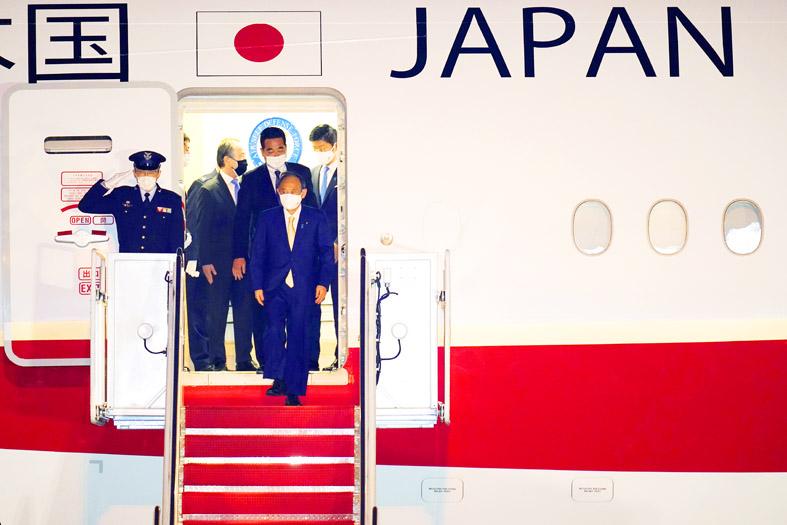US President Joe Biden and Japanese Prime Minister Yoshihide Suga were to present a united front on Taiwan in a summit meeting yesterday, a senior US government official said.
Biden and Suga were expected to agree on a joint statement on Taiwan at Biden’s first in-person meeting with a foreign leader, said the official, who spoke on the condition of anonymity.
Biden and Suga would also discuss Beijing’s treatment of Muslims in Xinjiang and its influence over Hong Kong, while also announcing a US$2 billion Japanese investment in 5G telecommunications to counter China’s Huawei Technologies Co (華為), the official said.

Photo: AFP
“You’ve seen a series of statements out of both the United States and Japan on the cross-strait circumstances on Taiwan, on our desire for the maintenance of peace and stability, on preserving the ‘status quo,’ and I expect that you will see both a formal statement and consultations on these matters,” they said.
The last time US and Japanese leaders referred to Taiwan in a joint statement was in 1969, when then-Japanese prime minister Eisaku Sato said that maintenance of peace and security in the “Taiwan area” was important for Japan’s security.
That was before Tokyo normalized ties with Beijing.
The move by Biden and Suga aims to ratchet up pressure on China.
However, such a statement appears likely to fall short of what the US has been hoping to see from Suga, who inherited a China policy that sought to balance security concerns with deep economic ties when he took over as prime minister in September last year.
In a statement after a meeting last month of US and Japanese defense and foreign ministers, the two sides “underscored the importance of peace and stability in the Taiwan Strait,” and shared “serious concerns” about human rights in Hong Kong and Xinjiang.
The US official said that the expected statement would follow on “nicely” from last month’s statement and that both countries, while not wanting to raise tensions or provoke China, sought to send a clear signal that Beijing’s dispatch of warplanes into Taiwan’s airspace was incompatible with peace and stability.
A Japanese Ministry of Foreign Affairs official this week said that it had not been decided whether there would be a joint statement, and two Japanese ruling party lawmakers familiar with the discussions said that officials have been divided over whether Suga should endorse a strong statement on Taiwan.
The US official said that Washington expected that “each of our countries has slightly different perspectives” and that the US would not “insist on Japan somehow signing on to every dimension of our approach.”
“We also recognize the deep economic and commercial ties between Japan and China, and prime minister Suga wants to walk a careful course, and we respect that,” he added.
With his first in-person summit with Suga, and another planned meeting with South Korean President Moon Jae-in next month, Biden is working to focus US military and diplomatic resources to the Indo-Pacific region, and managing China’s rising global power, which he sees as the critical foreign policy issue of the era.

The Central Election Commission has amended election and recall regulations to require elected office candidates to provide proof that they have no Chinese citizenship, a Cabinet report said. The commission on Oct. 29 last year revised the Measures for the Permission of Family-based Residence, Long-term Residence and Settlement of People from the Mainland Area in the Taiwan Area (大陸地區人民在台灣地區依親居留長期居留或定居許可辦法), the Executive Yuan said in a report it submitted to the legislature for review. The revision requires Chinese citizens applying for permanent residency to submit notarial documents showing that they have lost their Chinese household record and have renounced — or have never

A magnitude 5.6 earthquake struck off the coast of Yilan County at 12:37pm today, with clear shaking felt across much of northern Taiwan. There were no immediate reports of damage. The epicenter of the quake was 16.9km east-southeast of Yilan County Hall offshore at a depth of 66.8km, Central Weather Administration (CWA) data showed. The maximum intensity registered at a 4 in Yilan County’s Nanao Township (南澳) on Taiwan’s seven-tier scale. Other parts of Yilan, as well as certain areas of Hualien County, Taipei, New Taipei City, Taoyuan, Hsinchu County, Taichung and Miaoli County, recorded intensities of 3. Residents of Yilan County and Taipei received

Taiwan has secured another breakthrough in fruit exports, with jujubes, dragon fruit and lychees approved for shipment to the EU, the Ministry of Agriculture said yesterday. The Animal and Plant Health Inspection Agency on Thursday received formal notification of the approval from the EU, the ministry said, adding that the decision was expected to expand Taiwanese fruit producers’ access to high-end European markets. Taiwan exported 126 tonnes of lychees last year, valued at US$1.48 million, with Japan accounting for 102 tonnes. Other export destinations included New Zealand, Hong Kong, the US and Australia, ministry data showed. Jujube exports totaled 103 tonnes, valued at

BIG SPENDERS: Foreign investors bought the most Taiwan equities since 2005, signaling confidence that an AI boom would continue to benefit chipmakers Taiwan Semiconductor Manufacturing Co’s (TSMC, 台積電) market capitalization swelled to US$2 trillion for the first time following a 4.25 percent rally in its American depositary receipts (ADR) overnight, putting the world’s biggest contract chipmaker sixth on the list of the world’s biggest companies by market capitalization, just behind Amazon.com Inc. The site CompaniesMarketcap.com ranked TSMC ahead of Saudi Aramco and Meta Platforms Inc. The Taiwanese company’s ADRs on Tuesday surged to US$385.75 on the New York Stock Exchange, as strong demand for artificial intelligence (AI) applications led to chip supply constraints and boost revenue growth to record-breaking levels. Each TSMC ADR represents